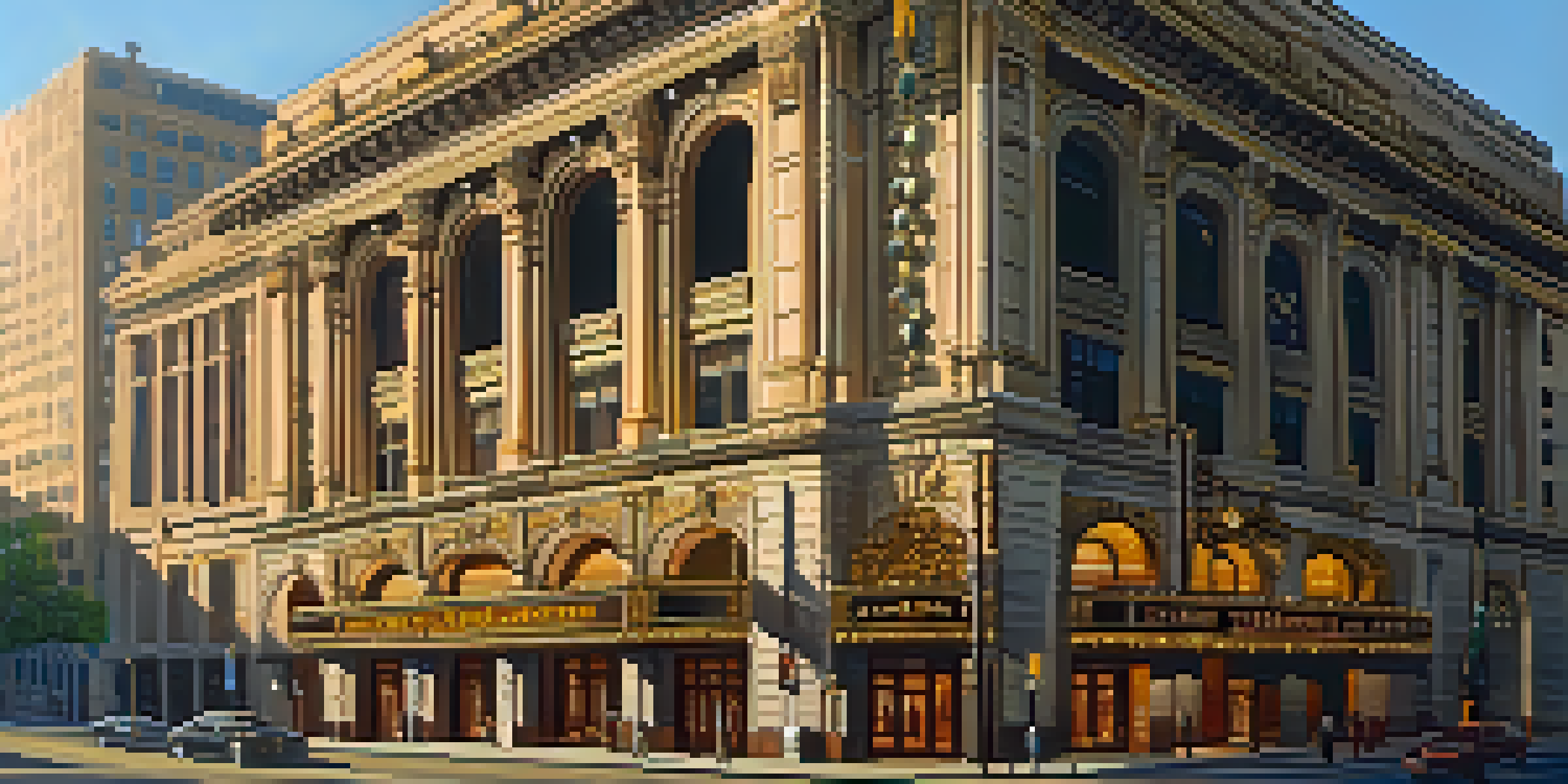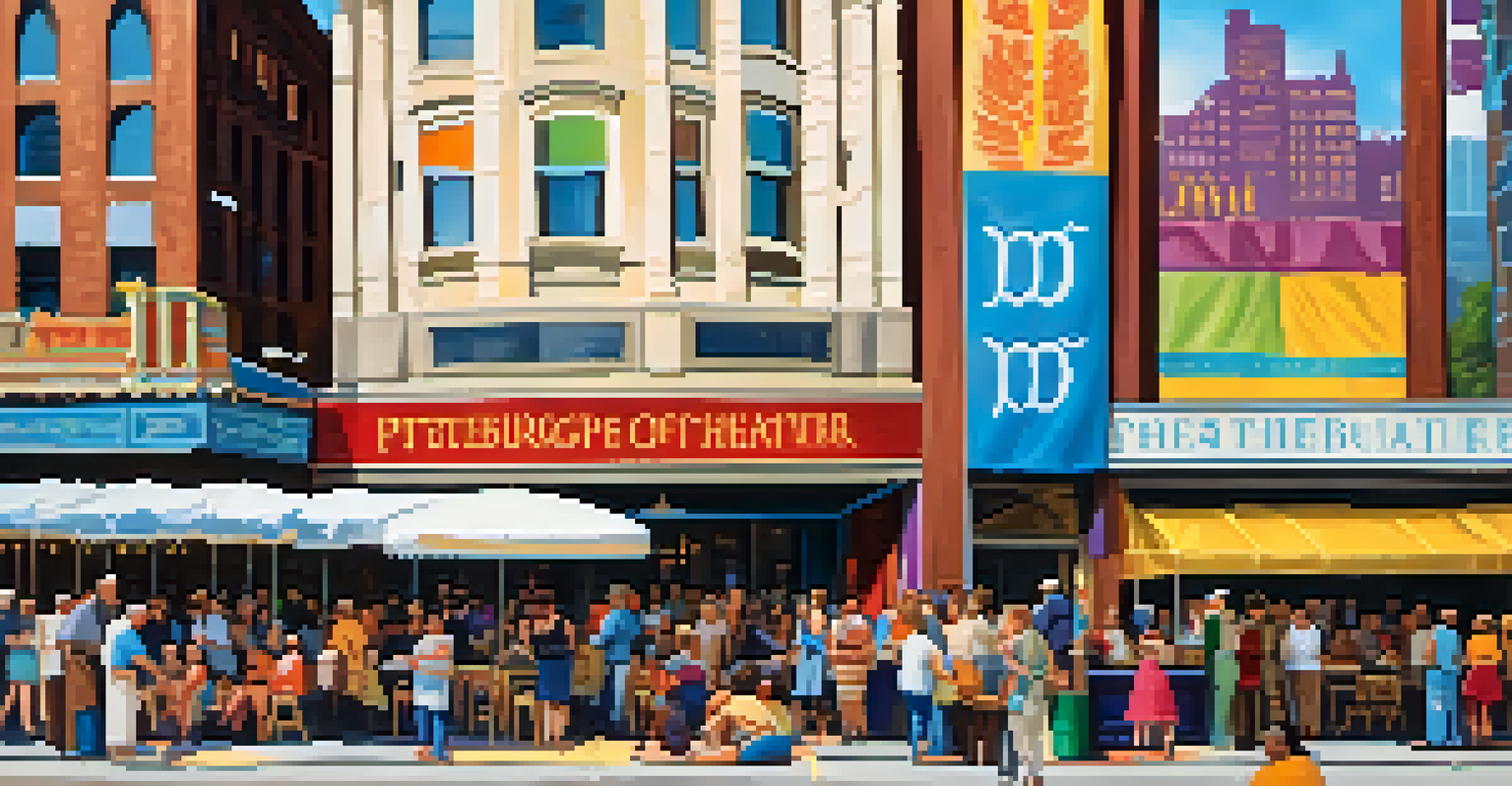Pittsburgh's Historic Theaters: Preserving the Art of Performance

The Rich History of Pittsburgh's Theaters
Pittsburgh's theaters are not just venues; they are storytellers of the city's rich cultural history. From the grand stages of the early 20th century to the more intimate spaces of today, each theater has its own unique tale. Take, for example, the Benedum Center, which has hosted everything from Broadway hits to local productions, embodying the spirit of performance in Pittsburgh.
The theater is a spiritual and social X-ray of its time.
The city's theater scene began to flourish in the late 1800s, driven by a growing population and a thirst for entertainment. Historic venues like the Byham Theater and the Harris Theater opened their doors, attracting talents and audiences alike. Each brick and beam holds memories of countless performances, creating a vibrant tapestry of artistic expression.
Today, these theaters are not just relics of the past; they continue to thrive, offering a platform for both emerging and established artists. The preservation of these spaces ensures that future generations can experience the magic of live performance, making them essential to Pittsburgh’s cultural identity.
Iconic Theaters and Their Unique Features
Each historic theater in Pittsburgh has its own distinct personality, often reflected in its architectural style and interior design. The ornate decor of the Heinz Hall, with its stunning chandeliers and intricate moldings, transports visitors back in time, enhancing the performance experience. Such details not only appeal to the eye but also to the emotions, making every show unforgettable.

The Stage AE, blending a modern vibe with historic roots, showcases how the city embraces innovation while honoring tradition. With its versatile space, it hosts a variety of performances—everything from concerts to theater productions—making it a cornerstone for the contemporary arts scene. This adaptability is what keeps the arts alive in Pittsburgh.
Pittsburgh's Theaters Preserve Culture
Historic theaters in Pittsburgh serve as vital cultural landmarks, showcasing the city's rich artistic heritage while engaging local communities.
Another gem, the Pittsburgh Public Theater, focuses on producing new works alongside classics. This dedication to diversity in programming not only highlights local talent but also fosters a sense of community among the audience, reminding everyone that the art of performance is a shared experience.
The Role of Local Artists in Preservation
Local artists play a crucial role in preserving the essence of Pittsburgh's historic theaters. They bring fresh perspectives and innovative ideas, breathing new life into classic works while also creating original pieces that reflect contemporary issues. This blend of past and present keeps the performances relevant and engaging for today's audiences.
Art is the most beautiful of all lies; it is a shadow of the truth.
The collaboration between artists and theaters often leads to community-driven projects that celebrate local history and culture. For instance, festivals hosted in these historic venues spotlight the talents of Pittsburgh's diverse artistic community, fostering a sense of pride and ownership among residents. These events are not just performances; they are celebrations of the city’s rich cultural landscape.
Moreover, initiatives that involve local schools and colleges help nurture the next generation of performers and creatives. By providing opportunities for students to engage with these historic spaces, theaters foster a love for the arts that can last a lifetime, ensuring that the legacy of performance art continues to thrive in Pittsburgh.
Challenges Faced by Historic Theaters
While Pittsburgh’s historic theaters are cherished, they face several challenges that threaten their survival. Aging infrastructure, for example, requires significant investment to maintain these beautiful spaces. Without adequate funding and support, many theaters struggle to keep their doors open, risking the loss of cultural landmarks.
Additionally, the shift in entertainment consumption, especially with the rise of streaming services, has impacted audience turnout for live performances. Many theaters have had to adapt their programming to attract audiences, offering a mix of traditional performances and modern experiences to stay relevant. This evolution requires a delicate balance to maintain the integrity of the historic space while appealing to contemporary tastes.
Community Drives Theater Success
Active community involvement and support are essential for the survival of Pittsburgh's theaters, helping to foster a vibrant arts culture.
Community support and engagement are vital in overcoming these challenges. Encouraging locals to attend performances, volunteer, and contribute to fundraising efforts can make a significant difference. By rallying together, the community can ensure these theaters continue to be vibrant hubs of cultural activity for years to come.
The Impact of Renovations on Historic Theaters
Renovations can breathe new life into historic theaters, striking a balance between preservation and modernization. Upgrades to sound systems, lighting, and seating can enhance the audience experience while maintaining the original charm of these venues. For instance, the recent renovations at the Benedum Center have improved accessibility and comfort, ensuring everyone can enjoy performances.
However, renovations also pose risks, as they may inadvertently alter the historic character of the space. Careful planning and consideration are essential to preserve the unique features that make these theaters special. Engaging with preservation experts and the community during the renovation process can help maintain the integrity of the original design.
Ultimately, successful renovations can position theaters for future success, attracting new audiences while honoring their storied past. These enhancements can lead to increased ticket sales and community engagement, creating a sustainable model for the ongoing operation of Pittsburgh's historic theaters.
The Future of Pittsburgh's Theaters
The future of Pittsburgh’s historic theaters looks promising, thanks to a growing appreciation for the arts within the community. Increased investment in local arts initiatives and a renewed interest in live performances are helping to ensure these venues thrive. The city’s commitment to supporting the arts through grants and programs demonstrates a recognition of the importance of cultural heritage.
Moreover, innovative programming that includes diverse genres and community engagement activities is attracting a wider audience. From immersive theater experiences to interactive workshops, these initiatives invite people of all ages to participate in the arts, cultivating a new generation of theatergoers.
Renovations Balance Past and Present
Careful renovations of historic theaters can enhance audience experience while preserving the unique character that defines these beloved venues.
As Pittsburgh continues to evolve, its historic theaters will remain vital to the city’s cultural fabric. By embracing change while honoring their rich history, these venues can continue to be a source of inspiration and creativity for years to come.
Celebrating the Arts: Community Involvement
Community involvement is a cornerstone of Pittsburgh’s theater scene, fostering connections between artists and audiences. Events such as open mic nights, community theater productions, and local artist showcases provide platforms for emerging talent. These gatherings not only entertain but also cultivate a sense of belonging among participants and spectators alike.
Local schools often collaborate with historic theaters to introduce students to the performing arts. These partnerships create opportunities for students to perform on renowned stages, instilling confidence and a passion for performance. Such initiatives are vital for nurturing the next generation of artists and theater enthusiasts.

Additionally, volunteering and attending performances can help strengthen community ties. When residents actively support their local theaters, they contribute to a vibrant arts culture that reflects the diverse voices of Pittsburgh. Celebrating the arts together creates a shared experience that enriches the entire community.